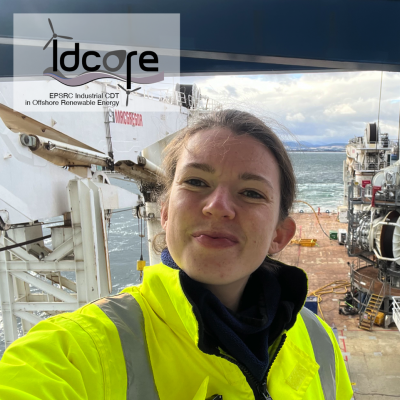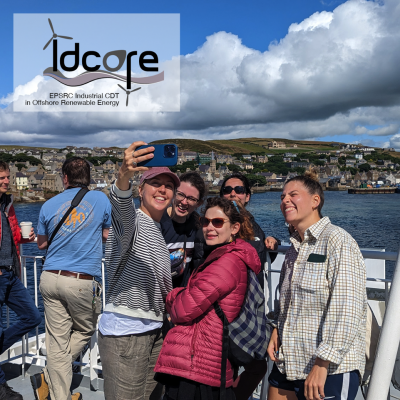In a recent announcement by Science, Innovation, and Technology Secretary Michelle Donelan, 65 different CDTs across the UK engaged in doctoral training in engineering and physical sciences were awarded a total of £1 billion. Out of this sum, IDCORE, the industrial centre for doctoral training in offshore renewable energy, was allocated £6M by the UK’s funding body, the Engineering and Physical Sciences Research Council (EPSRC), thereby allowing the program to continue delivering cutting-edge education and expand its partnership for another 5 years.
A closer look at the IDCORE program
Supporting the UK’s 2020 & 2050 targets for ORE,
Tthe IDCORE program allows students to translate their training into real-life scenarios. It secures them entrance into highly competitive industries after they complete their 4-year doctoral training course. It aims to engage students in multidisciplinary study and gain industry experience in offshore wind, wave, and tidal technologies.
The program's students engage with industry-based projects to deliver solutions to the rapidly evolving sector. Some examples include Dr Alyona Naberezhnykh, who worked with the European Marine Energy Centre (EMEC) and Orbital Marine Power to understand how turbulence measured across the EMEC test site affects Orbital’s turbine.
The impact of IDCORE has lasting effects that help shape novel technologies and instruments for ORE. It makes a profound impact on the students and their respective sponsoring companies. For example, tools initially developed by IDCORE students previously sponsored by JBA Consulting have been developed further by Susana Tores, an electrical engineer and part of the programme 2019 cohort, which has helped optimise the installation of offshore wind farms by applying them to floating wind.
Dr. JBA Director Mark Lawless said, "At JBA, we have a long and successful relationship with the IDCORE program, having hosted three students and employed four graduates. We hugely value the benefits that the IDCORE program has brought us, not least the high calibre of students who have worked with us and have been instrumental in developing and advancing novel new technologies for the offshore wind sector. Having Susana with us has been fantastic. The knowledge she has gained from the program and her previous industry experience have allowed her to rapidly engage with and advance an important new area for us in floating wind.
You can view more case studies on the IDCORE website.
Importance of collaboration for a brighter future for Offshore Renewable Energy
IDCORE highlights the need for direct engagement between academics and industry to develop innovative solutions. It enables responses to challenges in the implementation of offshore renewables and encourages experts across the leading universities and companies to come together in this global endeavour.
Professor David Ingram, Academic Director of Edinburgh’s School of Engineering and director of the IDCORE program, said, “I am delighted that the new IDCORE program has been funded and that we will be welcoming Swansea University into the partnership that delivers the UK’s leading Engineering Doctorate training program in Offshore Renewable Energy.”
The additional funding unlocks an additional £3M from industry, followed by £480k pooled through the partnership between the University of Edinburgh, the University of Exeter, Strathclyde University, the Scottish Association for Marine Science (SAMS), and the newly introduced Swansea University to train 50 students.
Professor Ingram comments, “It is hard to say where future IDCORE projects will go. We have exceptionally strong support from wave, tidal, and floating wind developers, engineering consultants, supply chain companies, energy utilities, and catapults. Our research project areas are led by industrial need and will continue to support initiatives such as: the installation of new HVDC cables to allow the UK to benefit from its huge marine energy resource; to support technology developers like Mocean energy, Nova Innovations and Orbital Marine Power to develop the next generation of wave and tidal energy machines; to help The Crown Estate identify areas for seabed leasing rounds; and more. All I can say is the projects will be high-impact and very exciting!”
The positive responses from the representatives of the participating universities further highlight the lasting impression IDCORE makes in the field. Professor Julia Race from the University of Strathclyde said, “The University of Strathclyde is proud to be partnering in the continuing success of the IDCORE CDT. The CDT wholly aligns with our University’s research strategy and significant contribution to transformational research in energy and ocean resources and has a significant role to play in delivering the next generation of leaders to address our national and global commitments for decarbonisation.”
Professor Ben Wilson, Associate Director for Science and Research at the SAMS said, “Our team at SAMS is delighted to hear that the IDCORE program has received further funding. Our summer schools teach these high-calibre doctoral engineering students why details of the natural environment and considerations for other stakeholder groups are fundamentally important for the successful deployment of offshore renewables.”
Professor Philipp Thies from the University of Exeter added, “The IDCORE EngD program is an excellent collaborative effort that shines through its synergies and cohort-building spirit. The students get academic and industrial experience; the industry sponsors benefit from academic ideas and state-of-the-art research; and the academics have the opportunity to work on applied industrial problems. I look forward to working with students, colleagues, and industry partners to contribute to the ORE sector.”
Applications remain open for UK-based students interested in following the IDCORE program. Learn more about the application process and important deadlines.




